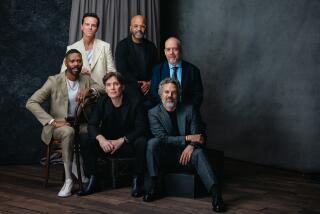AN APPRECIATION : Ralph Bellamy: Shining Versatility
- Share via
In days when the moguls still walked the Earth, the Hollywood studios were a series of stock companies. Richard Zanuck once boasted that his father, Darryl, could cast any film he wanted to by consulting the list of contract players on a sheet of paper beneath the glass on his desk top.
Ralph Bellamy, who died Friday at 87, was one of those expert and versatile players the industry in an earlier day was so expert at finding and keeping busy.
Handsome and stage-trained from his teen years, Bellamy was a leading man in his first film appearances 60 years ago, although mostly in unmemorable pictures that now seldom even disturb the insomniac small hours of television.
He became one of those great company actors who gave the customers the nice anticipation and the following satisfaction of knowing there were stars not only at the top of the credits but well down into the ranks of supporting players. Whether there can again be the population of character actors to match those of pre-television Hollywood is not clear in so changed a world. But meanwhile, the work of the Bellamy generation can still be seen and appreciated.
In fact, Bellamy proved to be one of the most versatile players in the business. His best-remembered film days were as a co-star who enriched whatever the proceedings were--who, in the most positive sense, helped to swell a scene.
He often played the other man, the temporary escort of the leading lady you rooted for the hero to win or win back in the end. His other-man-ness was established in Leo McCarey’s screwball classic, “The Awful Truth,” with Cary Grant and Irene Dunne as a divorcing couple. The film demonstrated that Bellamy had a fine gift for polished light comedy.
“We shot that in less than six weeks, without a script,” Bellamy said later. “Leo knew all the time what he was going to do, but he was the only one who did.” (There was a script, credited to Vina Delmar, but it seems to have served mostly as a basis for improvisations.)
By the time of Howard Hawks’ “His Girl Friday” only a few years later, Bellamy could do a portrayal that was a gentle ribbing of the kind of loser role he had made his own.
But there was more to his talent than helping others to shine, and Bellamy’s most extensive and admired outings were to come on the stage, most particularly playing Franklin Roosevelt in “Sunrise at Campobello” in 1958, a role he repeated in the film version in 1960.
What seems most impressive, looking back over Bellamy’s career, is the range of his work, not only in size, importance and venue, but also in tone and in the quantity of sympathy (or the lack of it) he was meant to evoke.
He was terrific, for example, as the domineering and unsympathetic husband of Claudia Cardinale in Richard Brooks’ classic Western, “The Professionals” in 1966, hiring a gang to retrieve the kidnaped wife who despises him. Arrogant and ruthless as the character was, Bellamy let you see that the man’s pain was real enough and that, if nothing else, he was worth some pity.
Like his contemporary and colleague Don Ameche, Bellamy found that the movies had good use for his image and his talent, even in his ninth decade. Both actors gave a wonderful brio to “Trading Places” in 1983. Indeed, until his final illness caught up with him, Bellamy had hardly stopped working since he graduated from high school right into the theater 70 years ago.
The late Leslie Halliwell, notoriously hard to please, awarded Bellamy a rare star of commendation in his “Filmgoer’s Almanac.” “For solid service and the occasional gleam of brilliance,” Halliwell said. Make that “frequent gleams of brilliance,” and it will do as a fair enough epitaph.
More to Read
Only good movies
Get the Indie Focus newsletter, Mark Olsen's weekly guide to the world of cinema.
You may occasionally receive promotional content from the Los Angeles Times.










